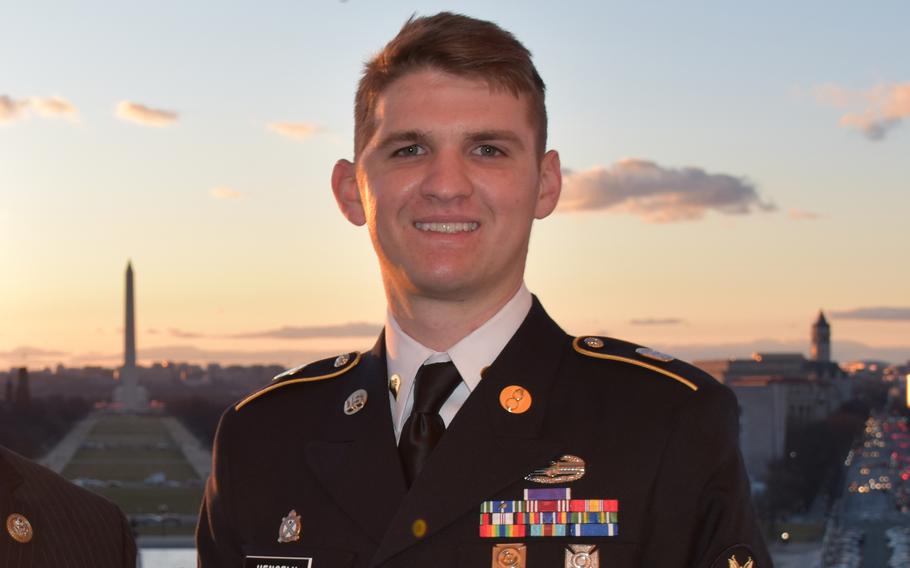
The U.S. Supreme Court agreed on June 2, 2025, to review a lawsuit filed against a defense contractor by Army veteran Winston Hencely, pictured here as a specialist in Washington, D.C., on Jan. 30, 2018. The suit stems from a deadly 2016 suicide bombing in Afghanistan that Hencely argues was enabled by the contractor’s negligence. (Courtesy photo/Rep. Buddy Carter)
An Army veteran who sued a defense contractor over injuries from a suicide bombing in Afghanistan will have his case reviewed by the U.S. Supreme Court.
Winston Hencely wants the justices to give a definitive answer to a question that has divided four appellate courts, which reached different conclusions about how an exception under the Federal Tort Claims Act applies to state-law claims against government contractors.
The high court agreed Monday to review the case this fall, it said in an announcement.
Hencely filed a legal claim against Fluor Corp. in South Carolina in 2019 alleging that the company had been negligent in the fatal attack at Bagram airfield three years earlier.
At the time, he was a 20-year-old specialist and was severely injured in the blast, which killed three U.S. soldiers and two civilian contractors.
The bomber, later identified as former Taliban member Ahmad Nayeb, was employed by a subcontractor of Fluor on base and made the explosives vest while on the job using company tools and components, according to a petition for Supreme Court review of Hencely’s case.
Hundreds of American service members were gathered at the site for a Veterans Day 5K run on Nov. 12, 2016, court filings say. Hencely noticed Nayeb approaching and confronted him with others, but Nayeb ignored their questions, according to the petition.
When Hencely grabbed Nayeb by his shoulder and felt the bulky explosive vest under his robe, Nayeb detonated the bomb. Hencely’s intervention prevented Nayeb from reaching the crowded starting line and likely saved lives, the petition states.
Projectiles from the bomb fractured Hencely’s skull and tore through his brain and chest. He continues to suffer from a traumatic brain injury, seizures and an inability to fully use his left arm and hand, or the left side of his face and mouth.
Hencely’s federal lawsuit against Fluor, which is based in Greenville, S.C., alleges improper supervision and retention of Nayeb under South Carolina law, saying that he walked 53 minutes unescorted from his work site across the installation on the morning of the attack.
The U.S. Court of Appeals for the 4th Circuit based in Richmond, Va., rejected Hencely’s claims on Oct. 30, 2024, ruling they were trumped by unspoken “federal interests” under the Federal Tort Claims Act. Two judges concurred, and the third agreed in part and dissented in part.
The 4th Circuit held that the federal tort exception protected the government against any “claim arising out of the combatant activities of the military or naval forces … during time of war.”
At least four other federal circuit court rulings have split on the question of whether the exception preempts state tort claims against federal contractors, Hencely’s attorneys wrote in their petition.
They are asking the Supreme Court to settle the matter once and for all.
Court filings included an Army determination that the primary contributing factor to the attack was “Fluor’s complacency, and its lack of reasonable supervision of its personnel.”
But the investigation also found fault with military leadership, citing in part counterintelligence shortages and shortcomings in contract oversight and administration by commanders and supervisors.
The 4th Circuit judges also noted in their ruling that, before the bombing, Fluor had proposed providing additional escort supervision of local nationals while at their work facilities, but the Army rejected that proposal.